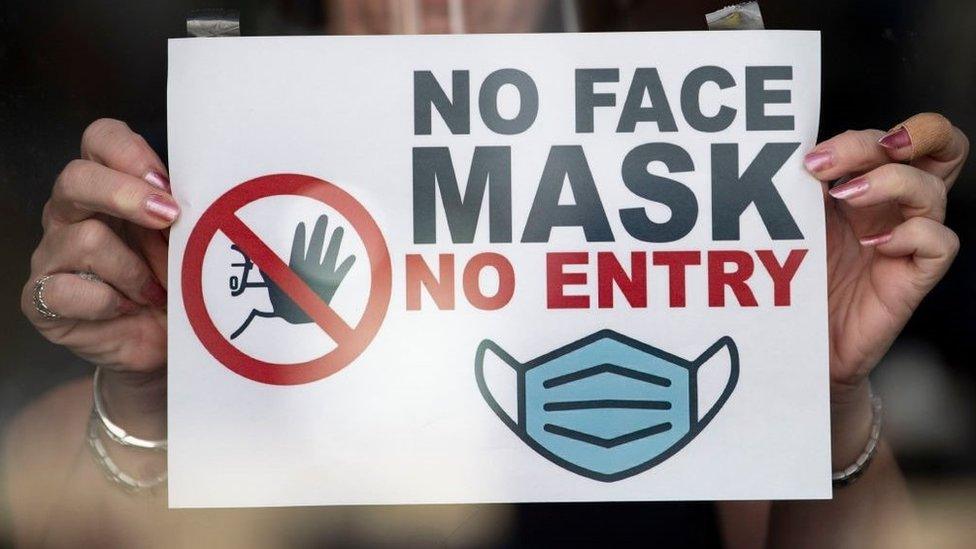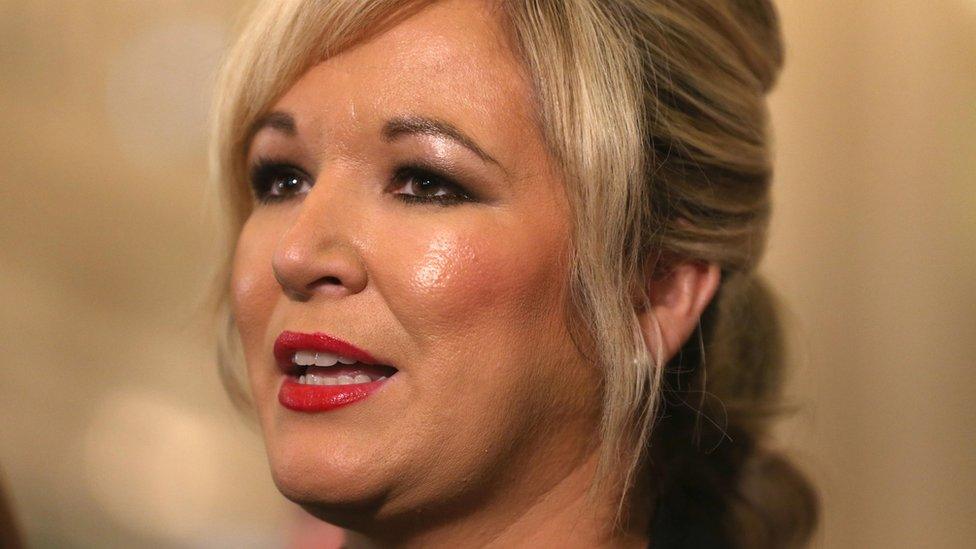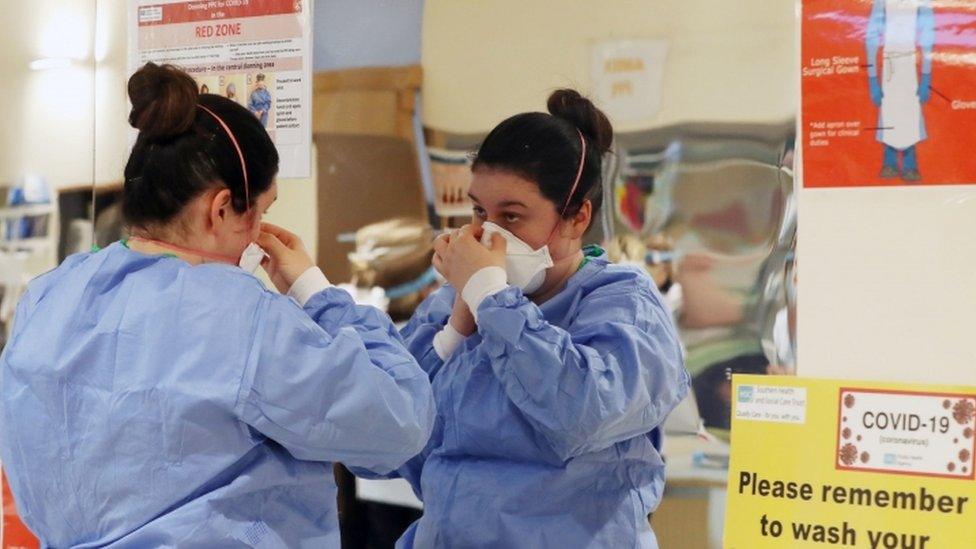Coronavirus: NI measures 'should last four to six weeks'
- Published
- comments

Tougher penalties for those who break coronavirus regulations were introduced last week by the executive
NI health officials are understood to have suggested tighter coronavirus measures should last four to six weeks to have the greatest impact.
Ministers have been considering ways to curb the spread in NI, as infection rates continue to spiral.
Thursday's executive meeting is set to be brought forward to Tuesday.
First Minister Arlene Foster has said any new measures designed to halt Covid 19 must do "maximum damage to the virus and minimum damage to the economy".
Speaking to UTV, Mrs Foster said the executive must listen to "all of the evidence".
She said there needed to be a "risk analysis" before any decisions are taken.
Questioned as to why there were differing political opinions about what to do next, the DUP leader said in a five-party coalition it is "not a surprise there is a difference of emphasis".
Earlier, a number of Stormont ministers took part in a meeting of the UK's emergency Cobra committee.
The need for "additional finances" was raised with the government during Monday's meeting, said Deputy First Minister Michelle O'Neill.
"Our Covid situation requires decisive action to stop the spread and therefore we need the finances to support workers, families and businesses in these challenging times," she tweeted.

Allow X content?
This article contains content provided by X. We ask for your permission before anything is loaded, as they may be using cookies and other technologies. You may want to read X’s cookie policy, external and privacy policy, external before accepting. To view this content choose ‘accept and continue’.

Later on Monday, the first and deputy first ministers and NI's health minister met the Northern Ireland Secretary Brandon Lewis, Irish Foreign Affairs Minister Simon Coveney to discuss the crisis.
A further three people have died in Northern Ireland after testing positive for coronavirus, according to daily figures from the Department of Health.
It means there have been 591 coronavirus-related deaths recorded.
The department also confirmed 877 new cases of Covid-19 had been reported in the past 24 hours.
In the Derry City and Strabane council area, the Covid infection rate has risen to 971 per 100,000 of the population over the past seven days.
Tighter restrictions have been in force there since 5 October, but the Western Trust has said hospital admissions are "doubling every three to four days".
'R-number reduction needed'
In the Republic of Ireland, a further 825 new coronavirus cases have been confirmed and one death.
There have now been a total of 43,531 confirmed cases of Covid-19 in the country and 1,827 deaths.
Meanwhile, BBC Radio Ulster's Stephen Nolan Show has reported claims from an unnamed executive minister that Chief Medical Officer Dr Michael McBride wanted restrictions to last the full six weeks, to be as effective as possible in reducing the R-rate.
The R-number represents the number of individuals who, on average, will be infected by a single person with coronavirus.
In Northern Ireland it is currently estimated at about 1.5, and officials have said more restrictions need to be introduced to bring R back below one.
The executive has the final say on any decisions.

Political split emerging

It is no surprise there are differing opinions between Northern Ireland's health officials and political parties about where to go next.
It appears that what happened in the Republic of Ireland - when the government diverged from public health recommendations to enforce the tightest level of restrictions - could be mirrored this week at Stormont.
DUP ministers want more evidence that the current restrictions on hospitality in hotspot areas are effective, before deciding whether to place them across all of NI.
They also remain concerned about the damage harsher measures will do to the economy.
Then there are massive questions about when to bring in any potential new measures and how long they should last.
A Stormont source said the takeaway from the Cobra meeting was that "sitting back and doing nothing is not an option", and the executive parties have said throughout the pandemic they would be guided by the science.
But political decision-making this time around may prove that it's merely part of a much bigger balancing act.

Dr McBride and Chief Scientific Adviser Prof Ian Young have advised that Northern Ireland-wide restrictions must be in place by no later than Friday, BBC News NI understands.
It is not clear what these restrictions would cover, but there is growing speculation they could:
Apply to the hospitality sector
Include schools potentially closing for an extended half-term break
But speaking on Monday, Education Minister Peter Weir said it was critical that schools remained open.
"There is a strong need as we move ahead to ensure that our children don't suffer further through loss of learning," said the DUP minister.
"There is a need to protect education, schools themselves don't seem to be particular spreaders."
Closing schools would not be helpful in any way helpful, said Mr Weir.
"Even short term closures would damage children's education," he added.
'Decisive action needed now'
Speaking in the assembly, Health Minister Robin Swann said his officials had called for "decisive action now" from the executive, with proposals submitted on Sunday evening.

DUP ministers have said they do not want to see a return to a situation where schools are closed
"The role of our chief medical officer and our chief scientific adviser is to provide advice from a health perspective," he added.
"Other sectors will quite properly have additional issues and concerns, and it is ultimately for the executive to consider all factors together. It would not be helpful to focus on any of these perspectives in isolation."
Mr Swann said he would not make the guidance public before it had been discussed by executive ministers.

Allow X content?
This article contains content provided by X. We ask for your permission before anything is loaded, as they may be using cookies and other technologies. You may want to read X’s cookie policy, external and privacy policy, external before accepting. To view this content choose ‘accept and continue’.

The first minister, deputy first minister and health minister held discussions about the crisis with Dr McBride and Prof Young on Sunday.
"Heavier restrictions are not inevitable," said Mrs Foster in a video posted on Twitter on Monday.
She said the executive would have "big decisions" to make this week, expressing disappointment that "a small minority" of people were ignoring restrictions.
'Why do we need a full lockdown?'
Her party colleague, Sir Jeffrey Donaldson, said he wanted to see more evidence about the effectiveness of tightened restrictions before the executive took further decisions.
"What we're asking the chief medical officer, is why do we need a full lockdown in those areas where the infection rate is much lower so as to combat the spread of infection in places like Derry and Strabane?" he said.
Nearly 6,000 people have tested positive in Northern Ireland over the past seven days - more than 30% of the total number of who have tested positive during the pandemic.
On Sunday, Communities Minister Carál Ní Chuilín said she had tested negative for Covid-19 but would self-isolate after several family members tested positive.
Michelle O'Neill is also self-isolating after a relative tested positive.

SOCIAL DISTANCING: How have rules on meeting friends changed?
FACE MASKS: When do I need to wear one?
TESTING: How do I get a virus test?

- Published10 October 2020

- Published10 October 2020
